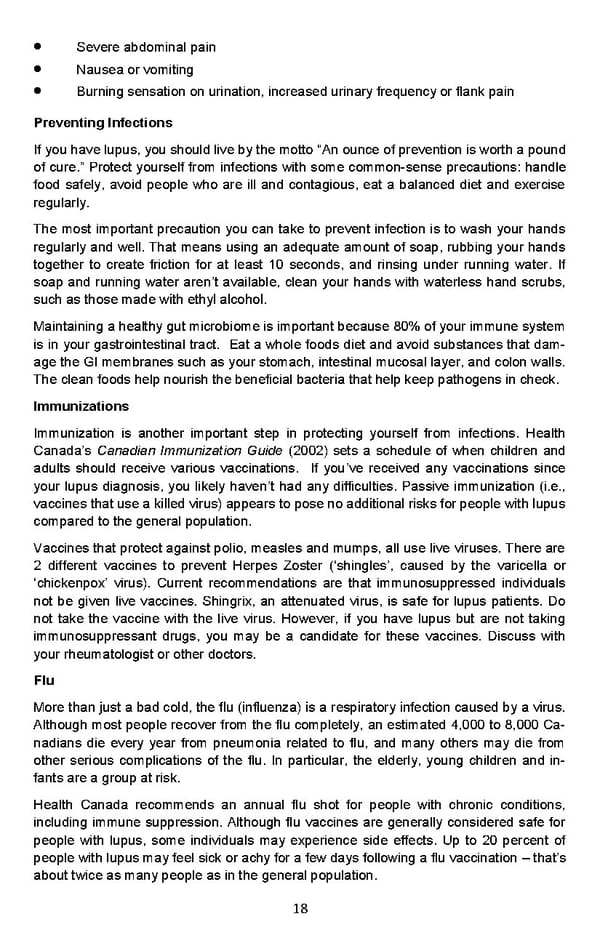• Severe abdominal pain • Nausea or vomiting • Burning sensation on urination, increased urinary frequency or flank pain Preventing Infections If you have lupus, you should live by the motto “An ounce of prevention is worth a pound of cure.” Protect yourself from infections with some common-sense precautions: handle food safely, avoid people who are ill and contagious, eat a balanced diet and exercise regularly. The most important precaution you can take to prevent infection is to wash your hands regularly and well. That means using an adequate amount of soap, rubbing your hands together to create friction for at least 10 seconds, and rinsing under running water. If soap and running water aren’t available, clean your hands with waterless hand scrubs, such as those made with ethyl alcohol. Maintaining a healthy gut microbiome is important because 80% of your immune system is in your gastrointestinal tract. Eat a whole foods diet and avoid substances that dam- age the GI membranes such as your stomach, intestinal mucosal layer, and colon walls. The clean foods help nourish the beneficial bacteria that help keep pathogens in check. Immunizations Immunization is another important step in protecting yourself from infections. Health Canada’s Canadian Immunization Guide (2002) sets a schedule of when children and adults should receive various vaccinations. If you’ve received any vaccinations since your lupus diagnosis, you likely haven’t had any difficulties. Passive immunization (i.e., vaccines that use a killed virus) appears to pose no additional risks for people with lupus compared to the general population. Vaccines that protect against polio, measles and mumps, all use live viruses. There are 2 different vaccines to prevent Herpes Zoster (‘shingles’, caused by the varicella or ‘chickenpox’ virus). Current recommendations are that immunosuppressed individuals not be given live vaccines. Shingrix, an attenuated virus, is safe for lupus patients. Do not take the vaccine with the live virus. However, if you have lupus but are not taking immunosuppressant drugs, you may be a candidate for these vaccines. Discuss with your rheumatologist or other doctors. Flu More than just a bad cold, the flu (influenza) is a respiratory infection caused by a virus. Although most people recover from the flu completely, an estimated 4,000 to 8,000 Ca- nadians die every year from pneumonia related to flu, and many others may die from other serious complications of the flu. In particular, the elderly, young children and in- fants are a group at risk. Health Canada recommends an annual flu shot for people with chronic conditions, including immune suppression. Although flu vaccines are generally considered safe for people with lupus, some individuals may experience side effects. Up to 20 percent of people with lupus may feel sick or achy for a few days following a flu vaccination – that’s about twice as many people as in the general population. 18
 Living Well With Lupus Facts Booklet Page 17 Page 19
Living Well With Lupus Facts Booklet Page 17 Page 19